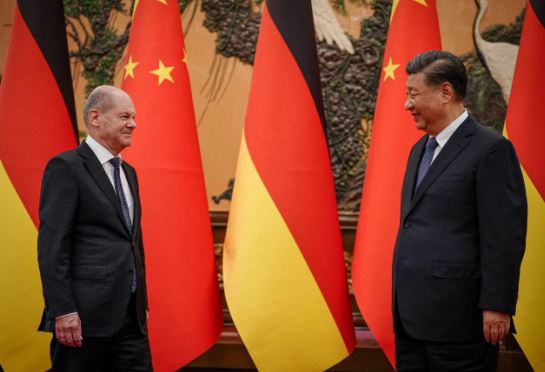Germany’s Strategic Approach: Reducing Dependency on China while Safeguarding Core Values
Germany has become acutely aware of its heavy reliance on China as its primary trading partner, prompting the formulation of an all-encompassing strategy aimed at lessening this dependency, particularly concerning crucial materials for semiconductor chips and electric vehicle (EV) batteries. In light of the intricate nature of their relationship, German Chancellor Olaf Scholz characterized China as a multifaceted entity—a “partner, competitor, and systemic rival.” This strategy document, released by Chancellor Scholz, places great emphasis on safeguarding Germany’s interests while upholding its fundamental values.
The primary objective is not a complete severance of ties with China but rather a strategic diversification of supply chains to more effectively mitigate risks. Chancellor Scholz made it clear that the goal is to avoid being critically dependent on China in the future and instead proactively respond to China’s ever-evolving and assertive stance. The strategy identifies key sectors such as health, energy transition, and technological innovation as critical areas where prompt risk reduction is essential and must be balanced with the economic viability of the German economy.
The document specifically addresses Germany’s reliance on China for various metals, rare earths, and lithium batteries. To address this challenge, Germany is planning to establish raw materials partnerships that benefit all participating countries, encouraging value creation within their respective borders. The overarching aim is to promote prosperity and bolster long-term competitiveness by moving beyond mere reliance on raw material extraction.
Although Germany is intent on reducing dependency on China for raw materials in EV batteries, it does not seek complete decoupling in the technology sector. Instead, the focus is on intensifying international cooperation in technological innovation and fostering stronger partnerships with countries that share similar values. The document also highlights concerns about China’s curtailment of civil and political rights and restricted access to research institutes and government agencies, prompting a reassessment of the bilateral relationship.
Delving into geopolitical matters, the document raises concerns about China’s expanding influence in the Indo-Pacific region, strengthened ties with Russia, and increased defense spending. It underscores China’s assertive pursuit of its interests, which has reshaped the global order, impacting global security and diplomatic relations.
Despite recognizing the systemic rivalry between the two nations, Germany remains open to cooperation with China under fair conditions. This viewpoint acknowledges China’s status as a critical market for German automakers. Notably, companies like Volkswagen, BMW, and Mercedes-Benz have established joint ventures in China, granting them substantial market share. While Chinese automakers have grown more competitive and expanded globally, Germany aims to navigate cooperation with China while minimizing risks and staying true to its values and interests.
In conclusion, Germany’s strategy endeavors to reduce dependency on China while fostering international cooperation and safeguarding core values. The plan acknowledges the complexities of the relationship and emphasizes the need to navigate systemic rivalry, economic interests, and geopolitical concerns to ensure a secure and prosperous future.

